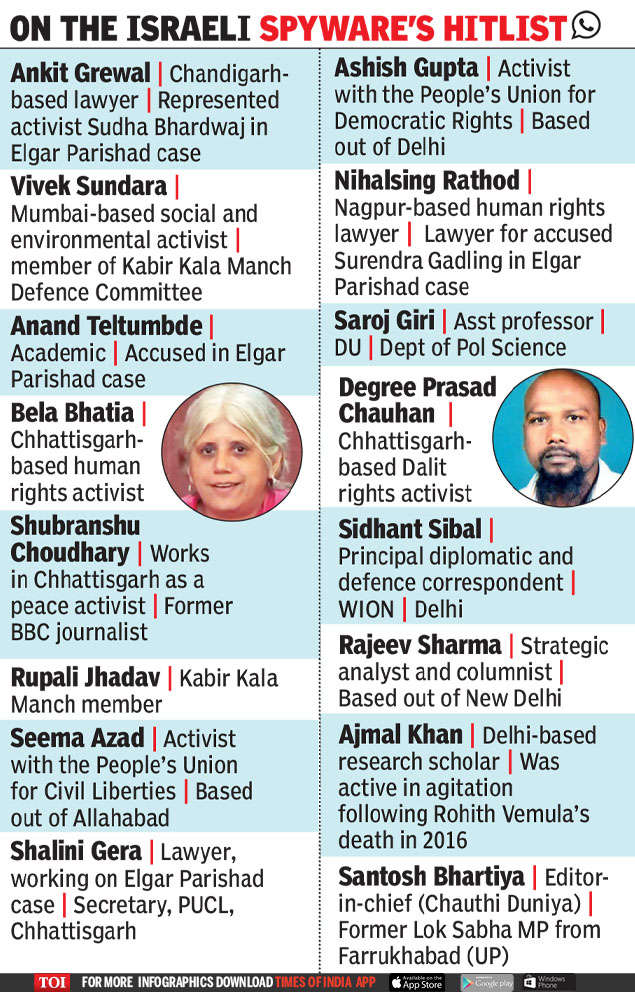Snooping Row: Who Were The Ones Spied On?

17 Indians' phones were possibly infected by frightening spyware. Most of these targets were either activists or human rights lawyers (Communist/Maoist sympathisers). Quite a few are defending those accused in the Elgar Parishad case. Some are fighting cases against Dalit atrocities. A couple are journalists
NEW DELHI: Early October, human rights lawyer Shalini Gera was contacted by John Scott-Railton from Citizen Lab, Toronto University. “He told me that I was at digital risk and encouraged me to check up on his background,” said Gera, part of the legal team defending activist Sudha Bhardwaj, an accused in the Elgar Parishad case which allegedly led to the Bhima Koregaon violence.
Gera was told that Citizen Lab had a list of phone numbers which the research unit believed was targeted by the cutting-edge spyware Pegasus from February to May this year. “My number figured in that list,” she said. Pegasus has been developed by the Israeli firm, NSO Group.
The lawyer was asked if she had received any suspicious missed call on WhatsApp.

“In the timeframe he described, I had received several suspicious video calls from an international number in Sweden. I had not picked them up because I did not know anybody in Sweden. John told me it was not necessary for me to pick up the call for the phone to be infected. But the fact that they kept calling again and again shows that it perhaps didn’t work. At the end of May, I lost my phone. And there’s no way of checking whether it was infected or not. Had it been infected, John said, all the contents of my phone would have been accessible to those on the other side. It made me feel very vulnerable,” she said.
Gera is one of the 17 Indians whose phones were possibly infected by the frightening spyware, which had also been used to spy on the slain Saudi journalist Jamal Khashoggi. All of them came to know of the possible breach from a call, a text message or an email from Citizen Lab, which had been approached by WhatsApp for help.
Most of these targets were either activists or human rights lawyers. Quite a few are defending those accused in the Elgar Parishad case. Others are tribal rights activists working in Chhattisgarh. Some are fighting cases against Dalit atrocities. A couple are journalists.
As per a 2016 price list, NSO Group charges its customers $650,000 (Rs 4.6 crore at current exchange rate) to hack 10 devices, in addition to an installation fee of $500,000 (Rs 3.5 crore), American business magazine Fast Company reported last year.
Nagpur lawyer Nihalsing Rathod, who represents several accused in Elgar Parishad case, told TOI that he had filed a complaint with WhatsApp in March but got a reply only earlier this month. “The first doubt came in March this year and I immediately alerted WhatsApp that my data is being breached due to some malware. They failed to respond at that time but Citizen Lab confirmed my doubts,” said Rathod who also represents Delhi University professor G N Saibaba, alleged to have Maoist links.
On being asked why he could be in the list, Saroj Giri said, “Everything I do is there in the public domain, we need to question the government. The government is acting very innocent right now but I am sure this has taken place at the highest level.” An assistant DU professor of political science, Giri is also part of the committee for the defense of Saibaba, who is now in a Maharashtra jail.
Gera, also secretary of People’s Union for Civil Liberties' Chhattisgarh unit, says that John had told her that the software costs millions of dollars. “It’s not something anyone can use. Only governments can afford to have this kind of software,” she said.
Chhattisgarh-based rights activists Bela Bhatia and Degree Prasad Chouhan — who were also objects of snooping — have described the attempt as a “severe intrusion of privacy.” Bhatia has been raising incidents of human rights violations in Maoist-affected Bastar. Chhattisgarh PUCL’s president Degree Prasad Chauhan feels government agencies could be involved in this surveillance that “breached his privacy by accessing his social media messages and updates”.
Former BBC journalist Shubhranshu Choudhary, who has been working as a peace activist in strife-torn Bastar, said he strengthened his cyber security after being informed by Citizen Lab about a month ago. “I have no idea why I am being targeted. Perhaps we are being watched closely because we are working as peace activists and trying to settle people who are displaced from Bastar,” he said.
Siddhant Sibal, defence and diplomatic correspondent, WION television channel, said he was asked to change the passwords of all his social media accounts.



No comments:
Post a Comment